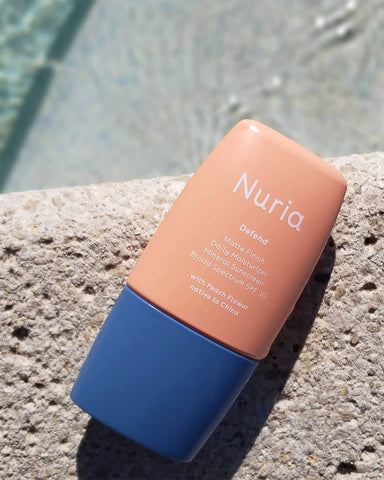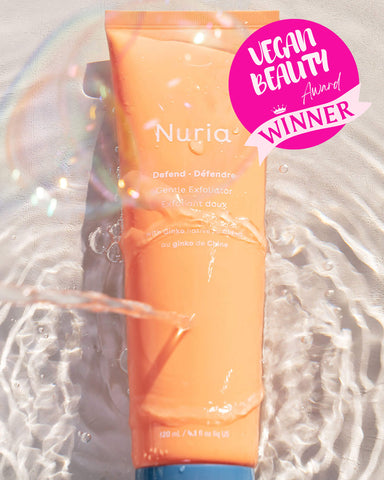
All About Blue Beauty
We’ve all heard of “going green"… but what about going blue?! Let’s not forget that using eco-friendly materials means protecting both the land and sea! With the #cleanbeauty movement on the rise, the cosmetics industry is making major strides towards reducing waste—not just in our landfills but our oceans, too. By protecting our coral reefs from pollution, we’re helping to keep our waters clean and protect countless sea creatures! So needless to say, blue beauty is a priority worth adding to our list of do-gooder duties.
What is blue beauty?
As a conscious consumer, blue beauty marks the mission to protect our oceans and marine life from cosmetics-related pollution. According to the International Union for Conservation of Nature (IUCN), “at least 14 million tons of plastic end up in the ocean every year, and plastic makes up 80% of all marine debris found from surface waters to deep-sea sediments.” Accounting for a huge portion of this waste, the cosmetics industry is among the top offenders.
In response to this crisis, the blue beauty initiative is working to transform how cosmetic companies operate. Basically, everyone should be taking accountability: first, starting with ourselves (since we’ve got the purchasing power!) and on a larger scale, the entire industry has a responsibility to become more sustainable.
It’s a matter of ethics
In a world of fast and cheap production, it’s often easier and more money-saving to manufacture products with low-quality ingredients and neglect the use of eco-friendly packaging. Since making maximum profit is the priority for many cosmetic companies, they are not too concerned about the size of their big, fat ecological footprint!
Yet each time we rinse off that facial mask or perfumed body scrub, we’re released of harmful leftover materials and residues, which travel through our drains and into our pipe systems, eventually polluting larger bodies of water!
By advocating for blue beauty, we’re bringing more momentum to a vision of cosmetic companies that care about these downstream environmental impacts.
How can we go blue?
By making informed buying choices, we as beauty consumers can make an enormous difference by supporting brands that are proven to be blue-friendly! At the same time, we can help by spreading awareness to empower our friends and peers in the cosmetics community.
To help you take these steps, we’ve noted the key criteria for recognizing a trustworthy product.
Blue, eco-friendly packaging
It’s no secret that plastic pollutants are the leading cause of our waste culture. That’s why a key aspect of blue beauty is supporting brands that use eco-friendly packaging.
The demand for sustainable packaging has turned countless cosmetic companies to using compostable materials or “bio plastics.” Similar to upcycling, bioplastics are repurposed from renewable resources and are compostable—meaning they can return to the earth naturally. When bioplastics aren’t available or aren’t compatible with the cosmetic product, companies are also choosing plastic resins that can be recycled and staying away from plastics like thermoset plastics, blister packs, or plastics with shrink-wrapped labeling.
By making these eco-smart choices, we prevent plastics from making the journey from our sewers to the ocean, where it can either resemble fish food or create death traps for marine life. As the World Wildlife Fund reports, “100 million marine animals die each year from plastic waste alone.”
In respect to this cause, we’re on route toward using 100% bio-safe packaging, choosing plastic resins that are recyclable and working on converting our best selling products to recycled resins or bio resins.
Be mindful of toxic ingredients
If it’s toxic to us, it’s toxic to marine life! So whenever we avoid ingredients like aluminum, parabens, and plastic beads, we’re not just protecting our health but also the habitats and livelihoods of sea animals, too. Ultimately, we need to recognize that by embracing products with toxins (including alcohol and other common cosmetic ingredients), we’re contributing to the waste problem in our oceans.
For example, the reason many naturalists use our mineral-based SPF lotion is because it does not contain chemical UV-blockers, which can pollute our water systems and impact marine plant and animal life. By using titanium dioxide instead of chemicals like oxybenzone or avobenzone, we’re maintaining a safe formula that’s in line with blue beauty standards.
Use reef-friendly materials
Here’s a shocking fact: according to NPR news, “14% Of The World's Coral Reefs Were Lost Between 2008 And 2019.” Due to the increasing levels of acidity and congestion from ocean pollution, there isn’t enough oxygen to sustain these reefs. Once this natural landscape dies, it creates a lethal chain reaction, disrupting entire ecosystems which rely on these reefs for protection and food.
Yet plastic waste isn’t the only threat to our reefs; we should also turn our attention to synthetic additives from cosmetics. For example, exfoliating products with microbeads can produce tiny impurities that impose enormous consequences for our water systems. Tiny sea creatures, like plankton for instance, can feed on these particles and die. This problem creates a ripple effect by harming even larger aquatic ecosystems. Remember that every living thing has its place in the balance of nature - sea creatures that feed on these little organisms will also die, which in turn, shrinks the food sources for larger fish, and so on!
We design reef-friendly formulas to respect the balance of nature. Among our most notable, our Defend Gentle Exfoliator has earned the support of many blue beauty advocates. It uses lactic acid, an organic skin-resurfacing agent, rather than using synthetic beads that create waste. And don't forget our all-mineral SPF primer, flawless, sheer protection without oxybenzone, octocrylene, & octinoxate, chemical sunscreens that can harm our oceans' reefs.
Since there are no official laws or regulations that monitor cosmetics in the US (since they’re not considered a drug by the FDA), it's our mission to draw these boundaries. If you’re inspired to participate in the blue beauty movement, we humbly ask you to share this post and spread the word! Each time we continue this conversation, we bring more momentum toward securing a zero-waste ocean!
About the author, Naomi Furgiuele
Naomi is the founder of Nuria and a self-professed nerd with a love for all things science and skin care. She’s had a hand in product development for some of the biggest global beauty brands in the business, gets some of her best ideas while out on a run, and loves her exfoliator almost as much as her awesome family.


